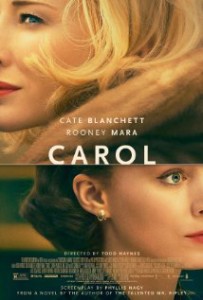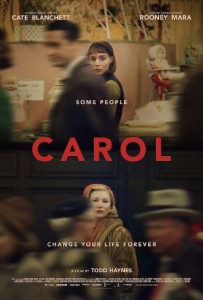Carol **** (2015, Cate Blanchett, Rooney Mara, Sarah Paulson, Kyle Chandler) – Movie Review
Todd Haynes revisits, sort of, the scene of his 2002 triumph, Far from Heaven, by filming Patricia Highsmith’s lesbian love story Carol.
Haynes casts Cate Blanchett, one of the stars of his last movie I’m Not There (2007), as Carol. She suffers as richly and glamorously as any old-time movie goddess as a down-trodden early Fifties American wife and mother, who doesn’t like men very much at all, certainly not her boring, stuffy husband, Harge Aird (Kyle Chandler), who seems to kind of love her in his stifling, paternalistic sort of way. He seems like the kind of man from the previous century who wouldn’t want women to have the vote because it couldn’t be good for them, and he’d know how to vote of their behalf.
Anyway Carol does what women usually do, she goes shopping at a New York department store, where she swiftly falls for a pretty, younger clerk, Therese Belivet (Rooney Mara) who has a nice boyfriend devoted to her and proposing marriage, but dreams of a better life. One with a woman, just like Carol. Conveniently, Carol leaves her gloves behind at the store. A quick, rather brazen courtship ensues, with Carol very forward and Therese flirtaciously easy to be led on.
The path to true love and happiness is not going to be easy, otherwise there’d be no movie, and Highsmith was reflecting her own troubles and feelings as a young woman, who just written Strangers on a Train at around the time this movie is set. We don’t get a clip from that, alas, but from Sunset Blvd, incidentally.
Carol has a best friend and former lover, Abby Gerhard (Sarah Paulson), who fortunately sticks around to help and advise her. Talk about bridge over trouble waters. Carol comes on as a victim but she wants it all, the money, the frocks, the daughter and the girlfriend. She seems a bit unsure, somehow nervous, shy and reticent, despite all her bravado and bluster, and fine façade. This is going to get in the way of Carol and Therese’s happiness. Indeed, it looks like there will be no darned happiness.
Carol plays like the women’s version of Brokeback Mountain, set in a reactionary America of the same period, with prejudiced straight men (that’s most of them) the main villains again. So it’s fair to compare it for achievement with Brokeback Mountain and Far from Heaven, though that’s actually unfair as comparisons are odious.
It’s a very fine film indeed, impeccably realised and gloriously acted, mostly very intense and dynamic. But also something about it is quite chilly and it ends up not actually being moving, certainly not tear-jerking, like Brokeback. There’s no big surge of emotion at the climax. And there kind of should be. This is maybe inherent in Highsmith’s material. She was one of the best thriller writers ever, but you get the idea that romance wasn’t really her thing. But Phyllis Nagy does a sterling job. She provides a very fine, lovingly honed screenplay that gives the actors all the nuances they need to turn in top performances.
Haynes’s cameras go in real close on Blanchett and Mara, perhaps too close. They’re up for it, ready for their close-ups Mr DeMille, er Haynes. So, finally, up. close and personal after all the foreplay, there’s a teeny weeny bit of torrid love making, but it’s as discreet as Brokeback Mountain’s. It all seems so terribly discreet after Blue Is the Warmest Color (2013). And it’s noticeable that we see more of Ms Mara than of Ms Blanchett. I only mention it because I noticed it.
Like with Suffragette, men don’t emerge at all well from Carol. They’re the target. Take aim and fire! In both films, there might be one token decent man sympathetic to the women. Unlike Suffragette, Carol is made by a man, and so was Blue. I only mention it.
Carol is a beautiful film, stately as a galleon, as gorgeous as a Fifties melodrama, maybe a Douglas Sirk film. It is nearly great but, like Carol herself, it just slightly lacks fire and passion. It doesn’t, maybe, have an outstanding story to tell, but it tells it splendidly.





